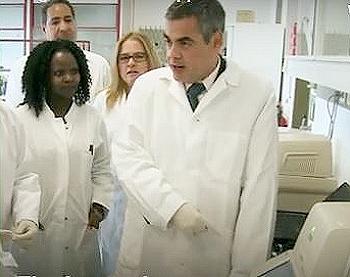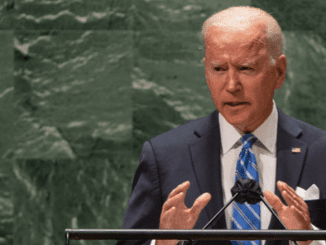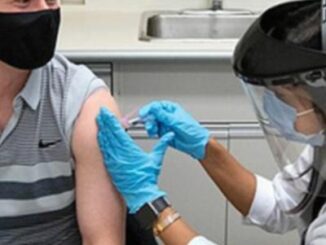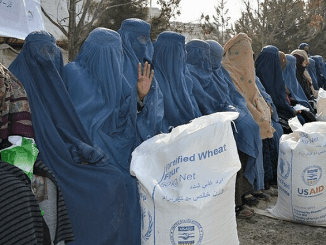
WASHINGTON, DC, April 30, 2020 (ENS) – With the number of confirmed coronavirus cases worldwide reaching 3,090,445 today and deaths amounting to 217,769 and rising, the world is still caught in the grip of this deadly virus that emerged in Wuhan, China late last December. Today, many organizations – national, international, public, corporate, and nonprofit – are sharing their resources with people who are risking their own lives to care for others. Here are a few of their stories.
Nuclear Diagnostic Supplies Sent to Labs in Poor Countries
The International Atomic Energy Agency, IAEA, is shipping vital testing equipment to more than 40 countries to enable them to use a nuclear-derived technique to quickly detect the coronavirus that causes the disease COVID-19.
This emergency assistance is part of the IAEA’s response to requests for support from around 90 countries in controlling the still-increasing number of infections worldwide, now soaring above three million, according to the World Health Organization.
Dozens of laboratories in Africa, Asia, Europe, Latin America, and the Caribbean will receive diagnostic machines and kits, reagents and laboratory consumables to speed up national testing, which is crucial in containing the outbreak.
They will also receive biosafety supplies, such as personal protection equipment and laboratory cabinets for the safe analysis of collected samples.
Further deliveries of equipment to the growing number of countries seeking assistance are expected in the coming weeks.
“IAEA staff are working hard to ensure that this critical equipment is delivered as quickly as possible where it is most needed,” said IAEA Director General Rafael Mariano Grossi. “Providing this assistance to countries is an absolute priority for the agency.”

one of the most widely used and accurate laboratory methods for detecting the novel coronavirus, real-time RT-PCR. (Photo courtesy IAEA)
The first batch of supplies will help countries use the technique known as real-time reverse transcription-polymerase chain reaction – real-time RT-PCR. This is the most sensitive technique for detecting viruses currently available.
“Real-time RT-PCR is an established and accurate method to detect pathogens. We’ve seen the number of Member State requests for support to run such tests more than double in the past two weeks,” said Ivancho Naletoski, technical officer at the Joint Food and Agriculture Organization of the United Nations/IAEA Division for Nuclear Techniques in Food and Agriculture.
Laboratories will receive diagnostic kits and accessories needed for the analysis, disposable protective gear and equipment for the molecular detection of this specific viral genome.
The IAEA is part of the UN Crisis Management Team on COVID-19. The agency is using its own resources as well as extrabudgetary funding for its emergency COVID-19 assistance. Several countries have announced major funding contributions for the IAEA’s efforts to tackle the pandemic.
To date, UN Member States have announced more than €9.5 million (US$10.3 million)in extrabudgetary financial contributions to the IAEA for this purpose, including US$6 million from the United States, C$5 million from Canada and €500,000 (US$543.600) from the Netherlands.
Australia has also made an important contribution. In addition, China has informed the IAEA about donations of detection equipment, kits, reagents and other medical materials worth US$2 million and provision of expert services.
“I am very grateful to the governments of the United States, Canada, China, the Netherlands and Australia for their generous contributions,” said Grossi. “I encourage others to contribute to this effort so that we can continue to swiftly respond to the growing demands from our Member States.”
3D Printers Redirected From Space
The European Space Agency is using its 3D printers to make face shields for hospital workers.
After the 3D printers devoted to space projects were shut down amidst the coronavirus pandemic, an idea to protect those fighting the outbreak on the front line was born.
Instead of printing new materials and bricks for future lunar habitats, two open-source 3D printers at ESA’s European Astronaut Centre (EAC) in Cologne, Germany, were set to work on face shields for hospital workers.

The printers are now producing headbands and brackets for personal protective equipment, PPE, and will be used in conjunction with a filtering mask. This type of face shield is essential in hospitals to protect staff against virus-bearing droplets.
The design has been optimized through crowd engineering for efficient and steady production.
ESA contributes its parts to the final product together with a wider group of makers. The first batch of 50 holder elements has already been delivered to a local collection point, where all components are assembled before the face shields are distributed to hospitals in need.
The team plans to continue printing remotely to meet the urgent demand as long as printing materials are available.
The 3D printers are usually busy making special items for astronaut training and testing ideas for future spaceflight. ESA is investigating how 3D printing could ease the construction, expansion, and maintenance of a lunar base.
Before the coronavirus lockdown, people were working on 3D printing new materials made of plastic and Moon dust simulants that could be used to build bricks for lunar habitats. This technology builds a solid object from a series of layers, each one printed on top of the last – also known as additive manufacturing.
The 3D printing approach aims for zero waste production and recycling and gives astronauts the ability to produce components as they need them, rather than carrying a full suite of spare parts into space.
Tax Help for Free
H&R Block is offering Tax Pro Go – our expert-prepared virtual tax service – absolutely free for all police, firefighters, emergency medical technicians and healthcare workers during the month of May. It’s a small thank you for the tireless work frontline workers are doing to help people and communities everywhere get through the COVID crisis.
“Every day we hear about the selfless acts of the frontline workers during this pandemic,” said Jeff Jones, president and CEO of H&R Block. “At H&R Block, we knew we had to do something to express our gratitude and appreciation for their courageous service. They are true heroes and as they continue to care for so many people, H&R Block would like to remove one potential worry for them by taking care of their taxes.”
During the month of May, frontline workers can file both federal and state tax returns for free through H&R Block’s expert-prepared, on-the-go service, Tax Pro Go. Frontline workers can simply visit www.hrblock.com/frontline and click the banner or any price to get started. They will be asked to upload a photo of a work ID to validate they are a police officer, firefighter, EMT, or healthcare worker, and then the tax professional will apply the offer.
“Over the last several months we have embarked on a community impact mission to Make Every Block Better,” said Jones. “As we recover from the effects of COVID-19 on our nation, we are strengthening our commitment to doing what we can to help communities all across the United States. It will take all of us working together city by city, block by block to come out of this pandemic even stronger than before.”
While H&R Block operates hundreds of offices in Canada and Australia, in addition to those in the United States, this free tax prep offer is only available in the United States.
Fighting Starvation
World Central Kitchen, WCK, based in Washington, DC, is a nonprofit NGO devoted to providing meals in the wake of natural disasters. It was founded in 2010 by celebrity chef José Andrés, who worked in the iconic El Bulli restaurant in Spain, from 1988 to 1990, and now owns restaurants in Washington, DC; Los Angeles, California; Las Vegas, Nevada; South Beach and Orlando, Florida; and New York City.
The organization prepared food in Haiti following its devastating earthquake and has organized meals in the Dominican Republic, Nicaragua, Zambia, Peru, Cuba, Uganda, the Bahamas, and in Cambodia.
After six weeks of WCK’s Relief Team working around the clock, its #ChefsForAmerica response to COVID-19 has served more than three million meals to vulnerable communities and frontline healthcare workers in over 155 American cities in more than 25 states and territories. WCK is now serving nearly 200,000 meals each day across the country.

In New York City, World Central Kitchen has launched Free Farmers Markets six days a week across the city. Working with Farmer Rich, WCK is purchasing from farms that typically serve restaurants that now are closed due to the virus, taking produce that otherwise would be thrown away and bringing it directly to families in need.
In California, WCK is working with the United Farm Workers Foundation to provide meals to farmworkers in California’s Central Valley.
Partnering with local restaurants in Delano, the site of a famous farmworkers’ strike, WCK set up a drive-through site for the community to pick up meals after a long day of work. The organization said in a statement, “WCK is proud to serve those working so hard to keep our food system going during the pandemic.”
After making the commitment to purchase one million meals from small, local restaurants to feed those in need, the WCK team has been working to bring these eateries on board across the country.
In the last week alone, WCK began working in New Orleans, Virginia Beach, Chicago, Detroit, and Las Vegas. This week, WCK began relief efforts in the city of Baltimore. Partnering with the school district, the team is handing out free meals to anyone in need at local schools multiple times a week.
Shoes and Socks on the Frontline
In Portland, Oregon, the footwear, apparel, and sports equipment company, Nike, announced new commitments of nearly $15 million in support of COVID-19 response efforts including $7 million to Oregon Health & Science University to help improve statewide COVID-19 care coordination, increase patient access to care, and bolster operational readiness for expanded diagnostic testing; $2 million to the Oregon Community Foundation in support of the Oregon Community Recovery Fund; and $1 million to the Oregon Food Bank.
In addition, the Nike Foundation pledged $1 million to the COVID-19 Solidarity Response Fund, $1 million to the Oregon Community Recovery Fund; $1.1 million to the King Baudouin Foundation in support of its community partnerships across Europe, the Middle East, and Africa; $250,000 to the Mid-South Food Bank in Memphis, Tennessee; $250,000 to the Community Foundation of Greater Memphis; and $500,000 to the Boston Foundation.
Keen Footwear, also based in Portland, has pledged to provide up to 10,000 pairs of shoes, valued at $10 million, to frontline workers and their families.
“Whether these shoes help a worker stay comfortable during a long shift or simply allow people to get outside to breathe in the benefits of nature while safely practicing social distancing, we feel compelled to share our strengths for the common good,” the company said on its website.
Superfeet, based in Washington State, has repurposed their HP Multi Jet Fusion printers from printing 3D insoles, to manufacturing life-saving medical equipment such as PPE masks with 3D printed elements. In the next four weeks, they will be supplying Northwest area hospitals with 30,000 masks.
John Rauvola, CEO and president of Superfeet, says once his team realized the need at their local hospitals, they got to work. From idea to final product, the quick shift and production time took less than one week.
“It’s easy to be overwhelmed by the sheer magnitude of COVID-19 and its effect on our daily lives and those around the world. We took a step back to look at how we could make an impact on a local level,” Rauvola says. “We are incredibly humbled to be part of a community that has come together to protect our healthcare workers.”
If your hospital is in need of PPE equipment, contact covidresponse@superfeet.com to determine if they can be of assistance.
Feetures, the North Carolina-based running sock manufacturer, has committed to donating up to 20,000 pairs of socks to hospital teams in areas hit the hardest by COVID-19. For every pair of socks purchased from a Fleet Feet location, Feetures will donate a pair to hospital staff.
Joe Gaither, Feetures’ vice president of marketing, says the combination of more people out running and walking and the desire to give back to the medical community inspired this idea.
Money Is Always Welcome
The Steering Body of the World Bank’s Pandemic Emergency Financing Facility, PEF, has allocated US$195.8 million to 64 of the world’s poorest countries with reported cases of COVID-19. Special attention goes to areas with the most vulnerable populations, especially in fragile and conflict-affected countries.
“This funding is in addition to the World Bank Group’s commitment of up to US$160 billion to fight COVID-19,” said Annette Dixon, vice president for human development at the World Bank. “PEF funding will supplement the critical emergency support operations underway to help save lives, detect, prevent and respond to coronavirus in poor countries.”
Specific funding allocations will be determined by population size and reported cases, with a minimum of US$1 million and maximum of US$15 million going to each country, and a heavier weight given to countries classified as fragile or conflict-affected. These countries face greater challenges with their health systems and are home to the most vulnerable people. Before the COVID-19 crisis hit, it was already estimated that up to two thirds of the world’s extreme poor would live in fragile and conflict-affected areas by 2030.
“We welcome that the PEF now provides urgently needed help for the poorest countries,” said Gerd Müller, minister of economic cooperation and development of Germany. “Crisis and refugee regions, in particular, need rapid support for stabilization. This is an important lesson from past health crises.”
The PEF Funds will be used to help vulnerable countries scale up testing, quickly identify new cases and treat them, and rapidly trace and isolate their contacts. The financing will also be used to help train health workers and maintain the delivery of essential health services to households.
“These funds directed at the most vulnerable countries show solidarity in the face of a common threat,” said Michael Ryan, executive director of the World Health Organization’s Health Emergencies Programme and co-chair of the PEF Steering Body.
Financial disbursements from the PEF will begin as soon as the first week in May, as governments from each of the countries submit authorized funding allocation requests.
This funding is in addition to the funding offered by the International Monetary Fund, IMF, a member of the World Bank Group, which has provided $… to some 90 of the world’s most vulnerable countries to help them fight the deadly virus.
The IMF is responding to an unprecedented number of calls for emergency financing from 102 countries to date. The IMF has doubled the access to its emergency facilities – the Rapid Credit Facility and Rapid Financing Instrument – allowing the IMF to meet the expected demand of about US$100 billion in financing.
Copyright Environment News Service (ENS) 2020. All rights reserved.
© 2020, Environment News Service. All rights reserved. Content may be quoted only with proper attribution and a direct link to the original article. Full reproduction is prohibited.



